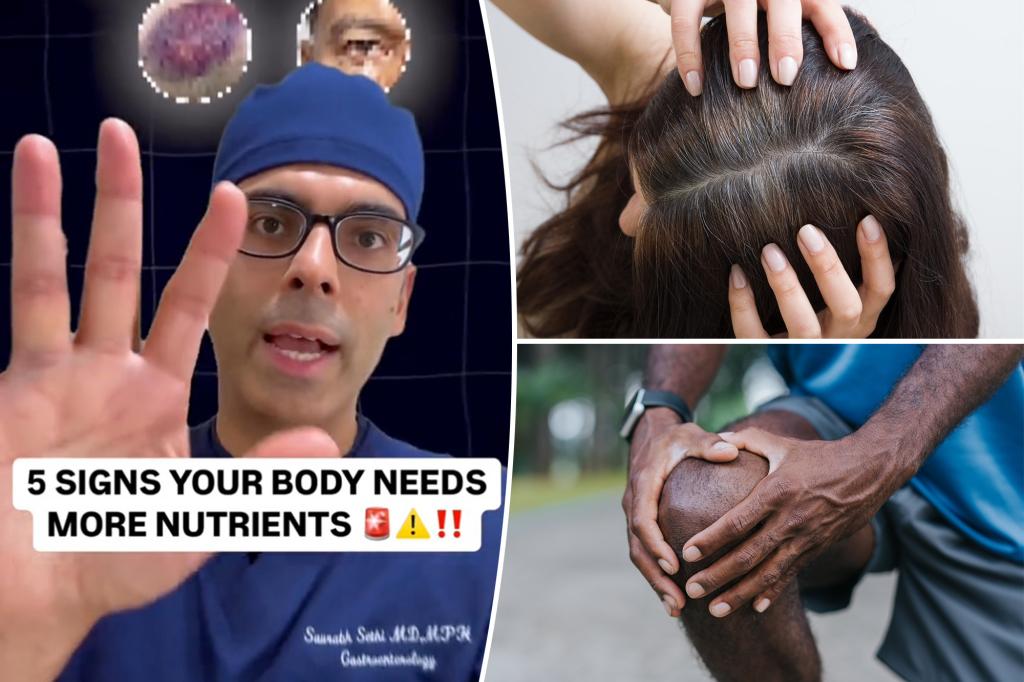Breaking News
Doctor reveals 5 signs your body needs more nutrients

It’s essential to fine-tune your nutritional plan.
A study published in August revealed that over half of the global population lacks sufficient micronutrients crucial for health, such as calcium, iron, and vitamins C and E.
California gastroenterologist Saurabh Sethi is now sharing five signs that indicate your body needs more nutrition: brittle nails, eyelid twitching, clicking of the joints, premature graying of the hair, and bruising easily.
Brittle nails
“This indicates a deficiency of protein and iron in the diet,” Sethi explained about brittle nails in a recent TikTok video.
Nails are primarily made of the protein keratin, so ensuring an adequate protein intake is crucial for healthy nails.
The Recommended Dietary Allowance for protein is 0.8 grams per kilogram of body weight, or 0.36 grams per pound. For a 150-pound individual, this amounts to 54 grams of protein daily.
Brittle nails, more common in women than men, can be caused by various factors such as frequent hand washing, use of acetone for nail polish removal, cold and dry weather, or simply aging. Thyroid disorders and iron deficiency anemia are also potential causes.
Foods rich in iron include red meat, poultry, fish, spinach, beans, whole grains, and eggs.
Eyelid twitching
“Twitching in the eyelids or limbs indicates a magnesium deficiency, which is crucial for nerve impulse transmission,” Sethi explained.
Myokymia refers to the orbicularis oculi muscle surrounding the eye that causes involuntary eyelid contractions.
The condition can be linked to stress, fatigue, caffeine consumption, electrolyte imbalance, eye strain, certain medications, and in rare cases, brain and nervous system disorders.
Magnesium plays a vital role in muscle function, and while magnesium supplementation is popular, consulting with a doctor is advisable to determine the most suitable type of magnesium for your needs.
Clicking of the joints
Cracking, clicking, or popping joints are common, especially with age, but Sethi warns that it could indicate a deficiency in vitamin D3 or calcium.
Calcium is essential for building and maintaining strong bones, while vitamin D aids in the absorption of calcium from foods like milk, sardines, and leafy greens.
Premature greying of the hair
Premature greying of hair occurs before 20 in white individuals and before 30 in African Americans. The exact cause is uncertain, but genetics, autoimmune diseases, pollution, smoking, stress, and vitamin deficiencies have been implicated.
“This could indicate a deficiency of vitamin B12, crucial for red blood cell production and oxygen transport to hair follicles,” Sethi mentioned. “It could also suggest a copper deficiency, responsible for melanin production that gives color to hair.”
Bruising easily
Easy bruising might be due to aging, genetics, underlying medical conditions like Cushing syndrome or Ehlers-Danlos syndrome, medications affecting blood clotting, or vitamin deficiencies.
“This could indicate a shortage of vitamin C, crucial for collagen formation,” Sethi suggested. “It could also imply a deficiency of vitamin K1, which aids in blood clotting.”
-

 Destination8 months ago
Destination8 months agoSingapore Airlines CEO set to join board of Air India, BA News, BA
-

 Breaking News10 months ago
Breaking News10 months agoCroatia to reintroduce compulsory military draft as regional tensions soar
-

 Gadgets3 months ago
Gadgets3 months agoSupernatural Season 16 Revival News, Cast, Plot and Release Date
-

 Tech News12 months ago
Tech News12 months agoBangladeshi police agents accused of selling citizens’ personal information on Telegram
-

 Productivity11 months ago
Productivity11 months agoHow Your Contact Center Can Become A Customer Engagement Center
-

 Gadgets3 weeks ago
Gadgets3 weeks agoFallout Season 2 Potential Release Date, Cast, Plot and News
-

 Breaking News10 months ago
Breaking News10 months agoBangladesh crisis: Refaat Ahmed sworn in as Bangladesh’s new chief justice
-

 Toys12 months ago
Toys12 months ago15 of the Best Trike & Tricycles Mums Recommend























